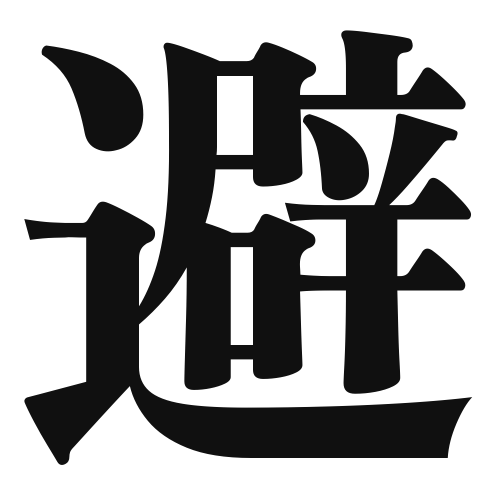1. Overview of Meaning
The kanji “避” (pronounced “hi” or “yokeru”) means “to avoid” or “to evade.” It conveys the idea of steering clear of something undesirable or dangerous.
2. Formation and Radical
Formation of the Kanji: The kanji “避” is a compound character that combines elements to convey its meaning. It consists of the radical for “movement” (辶) and the character “避” which relates to “to hide” or “to escape.” This combination suggests the action of moving away from something.
Radical: The radical of “避” is 辶, which is associated with movement or walking, indicating the action of avoiding.
3. Examples of Usage
Common Words and Phrases: Some frequently used words that include “避” are:
- 避ける (sakeru) – to avoid
- 回避 (kaihi) – evasion
Example Sentences in Daily Conversation:
- 危険を避けるために、早めに帰ります。
(Kiken o sakeru tame ni, hayame ni kaerimasu.)
(I will go home early to avoid danger.) - 彼はその問題を避けて通った。
(Kare wa sono mondai o sakete tootta.)
(He avoided the issue.)
4. Synonyms and Antonyms
Similar Kanji: A similar kanji is “逃” (to escape), which emphasizes the act of fleeing rather than simply avoiding. While “避” focuses on avoidance, “逃” implies a more active escape from a situation.
Opposite Kanji: The opposite of “避” is “接” (setsu), which means “to connect” or “to approach,” indicating a movement towards something rather than away from it.
5. Cultural and Historical Background
Relation to Japanese Culture: The concept of avoidance is significant in Japanese culture, where harmony and the avoidance of conflict are often prioritized. This is reflected in social interactions and communication styles.
Proverbs and Idioms: One relevant proverb is “避けられない運命” (sakerarenai unmei), meaning “an unavoidable fate,” which highlights the idea that some things cannot be avoided, no matter how hard one tries.
